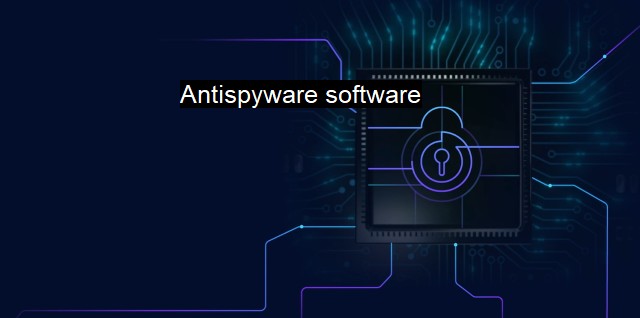What is Antispyware software?
Shielding Against External Forces: The Essential Role of Antispyware Software in Securing Personal Devices and Corporate Networks
Antispyware software is a cybersecurity mechanism designed to prevent and defend computers and computing systems from spyware. Spyware is a specific type of malicious software (malware) that covertly collects data about a user's interaction with their computer without their knowledge or consent. It often infiltrates a device when the user downloads software from the internet, clicking pop-up ads or through phishing links. As traditional viruses only aim to damage or corrupt systems and data, spyware work meticulously in the background to gather information. This information can range from browsing habits to more sensitive facts such as login credentials or bank details. In the broad spectrum of cybersecurity threats, spyware remains one of the most serious concerns necessitating specialized defense mechanisms, one of which is antispyware software.Antispyware software operates by detecting, quarantining, and removing spyware from a computer system. It aims to shield a system from potential threats underscoring its role as a critical tool for maintaining data security and user privacy. It holds a particular spotlight within the umbrella of antivirus solutions. Its work involves continuous scanning of the computer systems for known threats, tracking cookies, monitoring programs for suspicious behaviors, and accomplishing automatic removal of discovered threats.
While the term 'antispyware' might indicate particularity for spyware, these days, numerous modern antispyware programs incorporate functions combative to other types of malware as well, akin to traditional antivirus software. The distinction between antispyware and antivirus tools has become increasingly blurred, mainly due to the ever-evolving cyber threat landscape that frequently shifts between viruses, spyware, and other types of malware.
The complexity of spyware forms the primary reason for the existence of the antispyware software. Spyware often operates silently and covertly, making it challenging to detect. Some types of spyware might alter a system's settings to replicate themselves after unsuccessful remediation, whereas others might mutate over time to avoid detection. Therefore, comprehensive antispyware solutions delve into intricate protection mechanisms to fight these sophisticated threats.
Effective antispyware solutions maintain an extensive database of known spyware applications and use such databases for a consistent comparison with the incoming data and files. Upon finding a match, the antispyware software neutralizes the threat either by blocking it entirely or putting it into quarantine for further analysis. antispyware tools also use Heuristic-based detection techniques to identify previously unknown threats or new variants of known spyware.
Layered on top of that, most bewitching antispyware software comes with real-time protection or background guard mechanism which continuously monitors systems, rather than just periodic or on-demand scanning. Also, they offer preventive measures, such as suspicious behavior watching, to provide immediate alerts when an application tries to access system resources unusually.
While operating, antispyware software also takes judicious care of user privacy. Trusty antispyware software is programmed to understand what constitutes personal information and identifies attempts by unscrupulous applications to access such data. Once suspected, the software dynamically blocks such attempts, providing another layer of defense beyond detecting known malicious programs.
In an era where data theft and privacy breaches are rampant, antispyware software offers an essential line of defense against internet espionage. As part of a broader cybersecurity and antivirus approach, they keep a vigilant eye on the safety of our systems and personal data, effectively circumventing potential threats from spyware. Whether incorporated within an antivirus suite or operated stand-alone, an efficient antispyware software helps preserve the digital independence and secrecy of every individual and organization. Therefore, antispyware software stands as a towering prevention and remedy structure in the continuously challenging cybersecurity battleground.

Antispyware software FAQs
What is antispyware software?
Antispyware software is computer security software that protects your device from various types of spyware, malware, and viruses by detecting and removing them from your computer system. It helps in preventing data theft, identity theft, and other cybercrimes.How does antispyware software work?
Antispyware software works by scanning your computer system for any spyware or malicious software. Once it detects any suspicious activity, it will alert the user and provide options for removing the malware. It also keeps an eye on incoming traffic and installation of unknown software, blocking them if necessary.Is it necessary to have an antispyware software on my computer?
Yes, it is essential to have antispyware software installed on your computer. As cybercrime has increased over the years, having an antispyware software can protect your computer from various types of malware and security breaches.How to choose the right antispyware software for my computer system?
Choosing the right antispyware software can be a daunting task. However, you should consider the features, compatibility with your computer system, and user reviews before making a purchase. Look for software that offers real-time protection, automatic updates, and easy-to-use interface. It is also recommended to opt for a software that provides regular virus definitions and database updates.| | A | | | B | | | C | | | D | | | E | | | F | | | G | | | H | | | I | | | J | | | K | | | L | | | M | |
| | N | | | O | | | P | | | Q | | | R | | | S | | | T | | | U | | | V | | | W | | | X | | | Y | | | Z | |
| | 1 | | | 2 | | | 3 | | | 4 | | | 7 | | | 8 | | |||||||